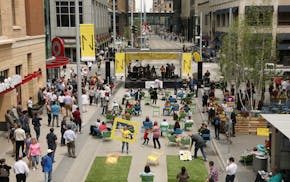After a close and dramatic vote last month, the Maplewood City Council decided to withdraw its earlier support of the $445 million Purple Line, a long-planned bus rapid transit project linking the east metro city to downtown St. Paul.
"It's the end of the Purple Line," Mayor Marylee Abrams declared.
Well, not quite.
Last week, a key advisory committee led by the Metropolitan Council acknowledged Maplewood's action, but then calmly went about its business planning the Purple Line, which, at the moment, involves designing the Twin Cities' latest bus rapid transit line that will largely use dedicated lanes for buses.
"We will continue our curiosity, our research and our planning," said Charlie Zelle, chair of the Metropolitan Council, which would build and operate the Purple Line.
The Purple Line Corridor Management Committee, which Zelle leads, did take an important step Monday by eliminating a portion of the beloved Bruce Vento Regional Trail as a possible route for the line, which could open as early as 2029.
Now, transit planners will concentrate on crafting a route for the Purple Line along busy White Bear Avenue north of Maryland Avenue in St. Paul. Service would link Union Depot in downtown St. Paul to Maplewood, although the exact location of the northernmost stop is still being studied.
In an interview this week, Abrams said she and others support a different kind of transit called arterial bus rapid transit (aBRT) for Maplewood, a popular service that operates in traffic, but is quicker and more frequent than local buses.
Abrams claims building and operating arterial bus rapid transit service along White Bear Avenue would be less invasive to businesses during and after construction, and would still provide meaningful transit service to the east metro. She said she worries that bus-only lanes on White Bear Avenue for the Purple Lines would add additional traffic to the corridor.
"[Arterial bus rapid transit] is a more nimble option," she said. "It makes so much sense."
Since the A Line debuted in St. Paul, Roseville and Minneapolis in 2016, aBRT service has proved popular in communities throughout the Twin Cities. Metro Transit also operates the C and D aBRT lines; the B and E lines are under construction, and another eight are planned, although those plans don't include the Purple Line route.
The aBRT routes are chosen along congested corridors plagued by speed and reliability issues, said Purple Line Project Manager Craig Lamothe said Monday. They typically replace high-ridership local bus routes.
"That's not how we'd characterize White Bear Avenue," he said. "White Bear Avenue has almost the opposite issue of high speeds making for unsafe conditions."
Abrams and others in Maplewood also questioned whether the nearly half-billion price tag for the Purple Line is worth it — the project's cost would be roughly split between Ramsey County and the Federal Transit Administration.
But Lamothe pointed out federal funds from the Purple Line aren't used for aBRT projects, which are typically built with state, county and local money. About $120 million of the Purple Line's budget is set aside as contingency, which may or may not be used.
The Maplewood City Council also said it supports micro-transit and autonomous vehicles to supplement transit. But Lamothe noted micro-transit service, which has been tested in north Minneapolis, is "not a freestanding service;" it needs to be anchored near existing light rail or bus stations or transit centers to ferry passengers to their final destinations.
And autonomous buses, Zelle added, "are not ready for prime time." The Minnesota Department of Transportation (MnDOT), where Zelle served as commissioner, has tested this service in three areas across the state, but they were manned by drivers in case a problem cropped up.
"Autonomous vehicles don't do well in rough weather," Zelle said. "I was on a bus when it literally stopped for a snowflake. That technology has a long way to go."
For now, the Purple Line will continue to be studied, despite Maplewood's action.
The council said in a statement it will work with local partners, including Maplewood, but it still maintains the Purple Line "is a strong transit project that would bring significant investment to the east metro." In its statement following Maplewood's vote, Ramsey County said much the same, calling the Purple Line "a forward-thinking project."
Maplewood's move last month follows similar action in White Bear Lake in 2022 opposing the project, which was initially planned to reach Hinckley. White Bear Lake's vote spurred Purple Line transit planners to rethink the route, even though municipalities along proposed BRT lines in the Twin Cities aren't required to support such projects.
Ramsey County Commissioner Victoria Reinhardt, a longtime Purple Line supporter who serves on the Corridor Management Committee, said in an interview this week that there's "some misinformation out there, we are really trying to work with the community, there are a lot of players and some strong support" for the project.
That includes state and local lawmakers in the area, Century College, health care practices and nonprofits.
"We still have so much to learn," Reinhardt said. "The bottom line is we need transit in the east metro if we are going to grow and improve our quality of life."
What we know about the federal raids across the Twin Cities
Legislators miss own deadline, eye possible weekend special session

In surprise testimony, brother says Derrick Thompson was driving in crash that killed 5 Somali women

Charges pending against 2 jailed Minneapolis raid protesters accused of assaulting officer

